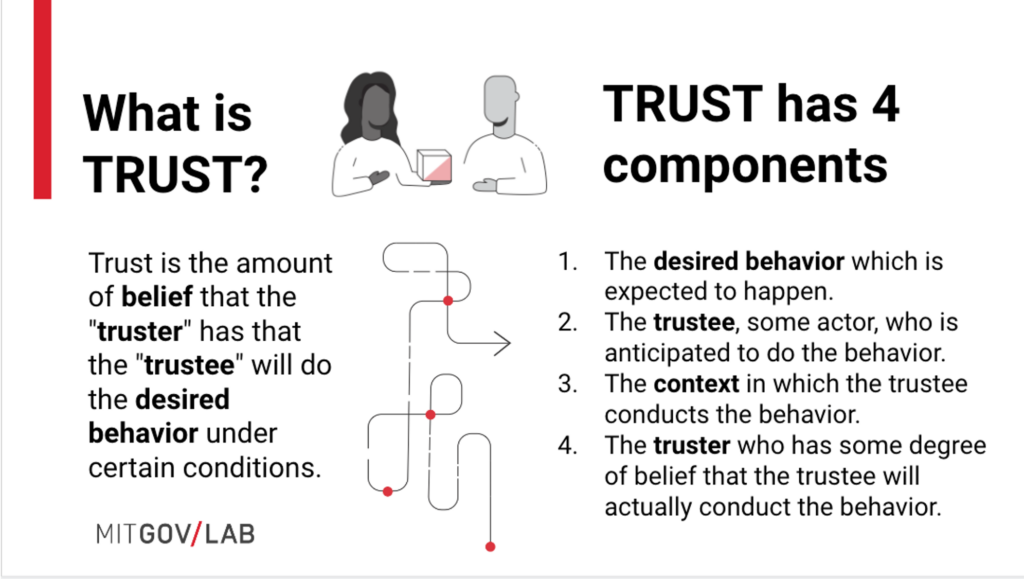Check out the online version and subscribe here to get the next digest.
“When people trust the government, they are more likely to trust each other, because they know the government has got their back. And this general interpersonal trust also deeply matters. Those who are more trusting tend to be more willing to engage with civil society. They are often healthier. They are richer. They are happier.” —MIT GOV/LAB Trust Mini Guide
Dear MIT GOV/LAB Community,
Trust is a singular thread that runs through our work at MIT GOV/LAB. Levels of trust have declined between people and government in recent years, as seen during the Covid-19 pandemic. As a result, we put together a mini guide on all things trust — what trust is, why it matters, and how to measure it— to develop a better understanding of trust and the role it plays in governance. Check out the guide and let us know how trust is showing up in your work.

Linking trust and public health
Building on our trust portfolio, we are wrapping up a series of research projects across four countries (Uganda, the Democratic Republic of the Congo, Nigeria, and Senegal) looking at how people’s trust in authorities shapes their attitudes towards Covid-19 vaccines, supported by the Bill and Melinda Gates Foundation.
For a deep dive with one of our partners, see this spotlight Q&A with Rawlance Ndejjo, a public health researcher at the Makerere University School of Public Health in Uganda.
Governance innovation highlights
Our governance innovation work is picking up steam (if you haven’t already, check out our new project website). We embedded two designer-researchers with government partners in Nigeria (Q&A with Frederico Vaz) and Sierra Leone (Q&A with André Arruda) who are working to identify roadblocks to innovating in government and develop solutions to public service challenges.
We also welcomed Mariama N’Diaye as MIT GOV/LAB’s Morningside Design Academy Fellow. She will be helping to write a series of case studies on designer-researcher experiences. And Seongkyul Park joined as the new governance innovation project manager.
Finally, a warm welcome to two new MIT GOV/LAB Faculty Associates: Professors Noah Nathan and Mai Hassan. Check out coverage of Professor Nathan’s research on the political impact of urbanization in Africa and throughout the Global South in MIT News. And, read more on Professor Mai Hassan’s research on authoritarian regimes, bureaucracy and public administration, and contentious politics.
Some additional updates below from work with partners and research affiliates:
- Behavioral science in the field. Busara and MIT GOV/LAB published a blog book featuring original research projects and experimental games developed by participants in our novel interdisciplinary “Behavioral Science in the Field” course.
- Practitioners-in-residence program updates. Anisha Singh from Busara presented at MIT on making behavioral science less WEIRD and Luke Jordan gave the keynote at the Code for Japan Summit on his “Don’t Build It” guide and why good ideas fail.
- Research support for graduate students. With funding from MIT GOV/LAB, Stuart Russell and Blair Read conducted research for their dissertations in Burkina Faso and India. Also, a Q&A with Elizabeth Parker-Magyar on policy and politics in Jordan.
- How community media in India holds local officials to account. Gabrielle Kruks-Wisner published new research in Comparative Political Studies on a network of citizen journalists in India and how information sharing can contribute to better citizen-state relationships.
- Crowdsourcing content to improve vaccine confidence and uptake in the Global South. Busara-MIT GOV/LAB case study assessing what types of messaging and messengers are the most effective in increasing Covid-19 vaccine confidence and uptake.
- Working paper on taxation in Lagos, Nigeria. Nicole Wilson and Leah Rosenzweig published a working paper with the International Centre for Tax and Development “Growth or Goods: Examining Tax Morale Among Property Owners in Lagos“.
- Interested in free online learning? Sign up for MITx “Covid-19 in Slums & Informal Settlements: Guidelines & Responses” featuring an MIT GOV/LAB case study: From Data to Covid-19 Policy in Sierra Leone.
